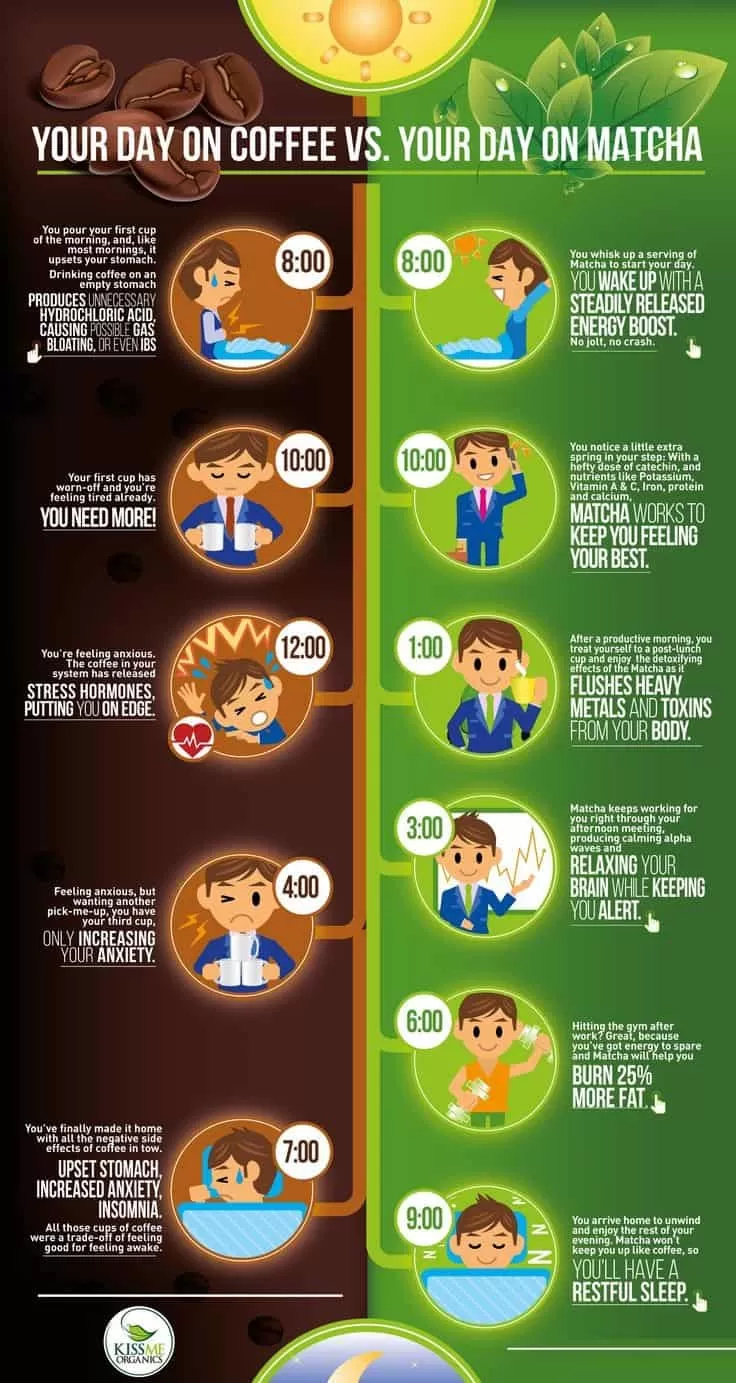Coffee is one of the conventional beverages consumed almost in the entire world. It is famous as an energy drink, as well as a drink to have when people meet.
Matcha, on the other hand, is a not-so-popular type of green tea. However, it is one of the best beverages when health is concerned. Let us find out who wins over who.
Processing Method
Matcha is a finely powdered variant of green tea. It is different from green tea in terms of its healthy content due to the way of its processing.
When we brew green tea, we tend to lose the much-required content since the water can extract only a fraction of it. Most of its antioxidants and minerals remain unused.
However, the case is not the same in Matcha. Matcha is stoneground tea leaves. It is not heated with the view to preserve its nutrients. It is less processed compared to green tea. There is no brewing of the fine powder during consumption.
Thus, you get to intake all the nutrients present in matcha and make the most out of it.
On the other hand, coffee is majorly produced in countries like Brazil, Colombia, Vietnam, Ethiopia, and Indonesia. It is harvested from the Coffea plant. It is removed from a seed or a bean and then dried for ultimate use.
Antioxidants
Matcha is the queen of antioxidants. The antioxidants are an essential intake of the human body. This is because they restrict the oxidation of various molecules in the body that cause aging.

If you drink a cup of matcha, you tend to intake as many antioxidants as a total of 10 cups of green tea can fetch you.
Compared to coffee, matcha still wins.
These antioxidants improve aging along with fighting cancer-causing cells.
The important antioxidants present in matcha are catechins, polyphenols, flavonoids, and epigallocatechin gallate (EGCG). These antioxidants provide a lot of health benefits. As mentioned above ECGC fights the most with the cancer-causing cells.
The antioxidant quantity in matcha is 137 times more than those present in the coffee. Thus, matcha wins when it comes to improving mental health, lowering cholesterol, improving your metabolism, and fighting the cancerous cells in the body.
Caffeine Level
The caffeine content in Matcha is pretty less compared to that of coffee. The caffeine in the coffee increases the insulin and adrenaline glucose levels in the body. They lead to faster heartbeats and cause anxiety.
One may also feel heart palpitations on excess consumption of coffee.
Matcha containing less of it promotes alertness without causing symptoms like nervousness or increased heart rates. Overall, matcha shows the benefits of caffeine whereas drinking excess coffee leads to adverse effects of caffeine.

Matcha has the L-Theanine amino acid that produces a calming effect in the body. It reduces anxiety and enhances the mood.
Energy and Productivity
Matcha has almost 34 – 70 mg of caffeine which is equivalent to half a cup of espresso. The caffeine in coffee absorbs into the bloodstream very quickly.
On the other hand, due to the presence of L-theanine the caffeine in matcha absorbs slowly releasing energy for more time. When it comes to the energy levels among the two, matcha ultimately wins over coffee.
Since matcha provides more energy compared to coffee for long time intervals, it is the ultimate winner to boost up your productivity.
Why not consider having matcha instead of hourly shots of coffee while working?
It shall help you a lot better. Matcha can keep you more focused on your daily tasks and help you do better.
Oral Hygiene
Matcha has antibacterial properties. These help in preventing teeth from plaque build-up. Thus, it is a perfect source for improving general health. Coffee, on the other hand, causes bad breath.
Detoxification of the Body
The contents of matcha tea do not end here. Matcha has a combination of iron, potassium, protein, calcium, vitamin A, vitamin C. This combination is a potent source of boosting your immune system.
Moreover, the high quantity of chlorophyll is an effective detoxifier. It permits the body to get relieved of toxins, impurities, and heavy metals.
The chlorophyll content in matcha is even more than regular green tea. This is because the producers cover matcha leaves a month before its harvest to save its nutrients. For the same reason, matcha has a darker green texture.
Weight Loss
Another great benefit of the two beverages is an increased metabolism rate. However, matcha wins over coffee on this factor too. Matcha helps in burning calories and leads to faster weight loss.
Skin
Matcha with abundant antioxidants has anti-aging properties. It helps fight off skin diseases. Moreover, it is a great component to help you with UV radiation effects. Coffee tends to cause acne eruptions.
While matcha, in contrast, has the required anti-bacterial properties to clear any acne occurrences. It provides the skin with a healthy glow.
Conclusion; Matcha vs. Coffee – Who Wins?
Yes, since every factor led to matcha providing more benefits compared to coffee, it is the ultimate winner when it comes to health. It definitely isn’t easy to shift to matcha for various reasons.
The first is the taste and the second, is the price. Thus, it may take time to shift over matcha, but it surely has better benefits over coffee in daily life.
It is the most effective on consumption if you have it after a workout. This is because the body requires immense energy that matcha may supplement.
Coffee can definitely be a drink while you hang out with friends or have official meetings, but matcha is a perfect choice to make when it comes to health.

